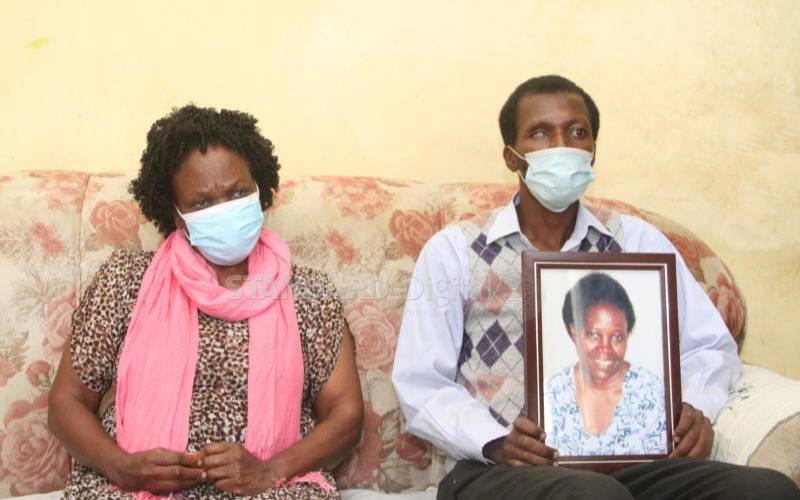
A family drained by sickness is now saddled with grief and haunted by huge hospital and mortuary fees.
At a flat in Nairobi’s Jerusalem estate, we meet James Muchiri, 33, and Samuel Macharia, 21. They have relocated from their family home at Ayany in Kibra. The two are the only ones left in the family since their parents are dead.
On this date, their aunt, Dorcas Wanjiku, has paid them a visit. She revisits how fast the family’s fortunes took a downward spiral at the onset of illnesses that struck their father and later their mother.
“My brother was a banker who had a house wife who dabbled in small businesses. They were doing fairly well,” says Wanjiku.
Then in 2016 James and Samuel's father Francis Macharia was diagnosed with colon cancer. He braved the illness until 2018 when he succumbed.
“The chemotherapy and other costs related to cancer treatment was very expensive. The family was left at a disadvantaged financial position,” says Wanjiku.
However, they still retained their house at Ayany. Then as things appeared to calm down, their mother Ann Waitiri Macharia began ailing. Initial symptoms included numbness of the limbs and she sought orthopaedic treatment at the Kijabe Hospital.
Her condition worsened due to breathing complication. The family later sought medication at the Aga Khan Hospital, then MP Shah Hospital and finally Nairobi South Hospital.
“An initial examination of the lungs showed a white colouration... There was also fluid in the lungs and attempts to drain it proved complicated. She was admitted to the general ward in January 2020 for a week then to the Intensive Care Unit,” says Wanjiku.
Her condition deteriorated fast and was placed on ventilator support.
A test established she suffered from motor neuron disease, an ailment in which one’s nervous system degenerates over time.
At some point, the family considered purchasing a ventilator but was cash-strapped. She died on December 31, 2020, at the Nairobi South Hospital.
A look at her medical bill dated February 2, 2021, shows the family owes the hospital Sh18.892 million. The family says the figure was initially Sh21 million before the National Health Insurance Fund paid some Sh1.4 million.
Between January 2020 and July 2020, the family deposited amounts ranging from Sh9,000 to Sh32,000 before paying Sh500,000 in November 2020 (money initially raised to purchase a ventilator).
In December 2020, the family deposited another Sh200,000 before adding some Sh450,000 in January 2021.
The Nairobi South Hospital Human Resources Manager Stephen Mutavi said the health facility has been engaging the family over the matter.
“The family provided security of around Sh6 million to try and reduce the balance,” said Mutavi.
This security is the family home in Ayany, Kibera. The family argues the property was valued at Sh8.5 million (Sh5m for the land and Sh3.5m for developments). The other predicament facing the family is the rising mortuary fee.
“Since we do not have a mortuary here (Nairobi South Hospital), the body is currently at Umash Funeral Home where it has been since December 31, 2020,” says Mr Mutavi.
Now since the funeral home has an offer of a two-week package, the family owed the morgue some Sh32,000 by January 13, 2021. The usual fee is Sh2,500 a day, meaning as at March 28, 2021, that is 74 days later, the family owed another Sh185,000 plus the initial Sh32,000.
The body cannot be released to the family because of pending bills. In the best case scenario, the Sh18.892 million, less the said value of the house (Sh8.5 million), would reduce the balance to about Sh14 million.
Government spokesman Colonel (rtd) Cyrus Oguna, while making clarifications on burial protocols in Covid-19 times on March 27, 2021, stated that all bodies, regardless of the cause of death, should be buried within 72 hours. This remained a grey area. When pressed for clarification in case a hospital detained a body over pending bills, his response was doggy.
This means the family is on its own.
 The Standard Group Plc is a multi-media organization with investments in media
platforms spanning newspaper print
operations, television, radio broadcasting, digital and online services. The
Standard Group is recognized as a
leading multi-media house in Kenya with a key influence in matters of national
and international interest.
The Standard Group Plc is a multi-media organization with investments in media
platforms spanning newspaper print
operations, television, radio broadcasting, digital and online services. The
Standard Group is recognized as a
leading multi-media house in Kenya with a key influence in matters of national
and international interest.











